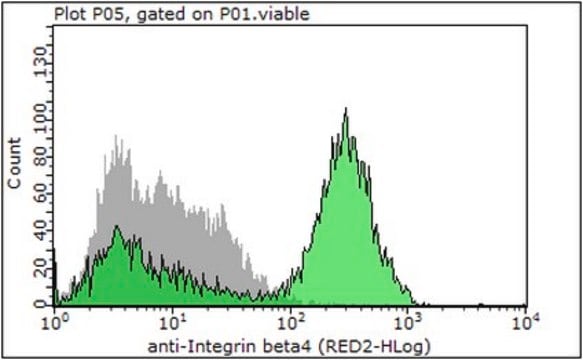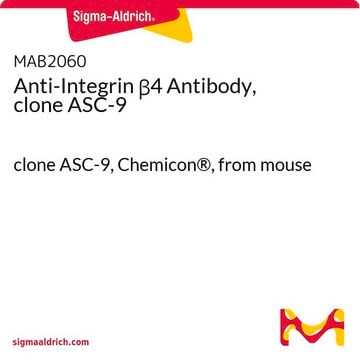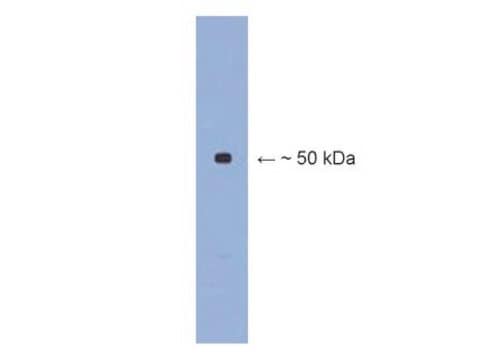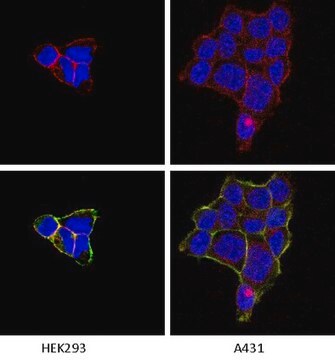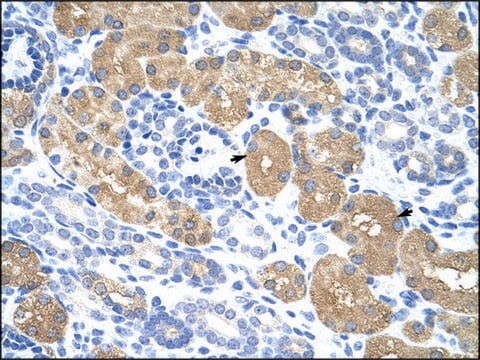MAB2058
Anti-Integrin β4 Antibody, clone ASC-3
clone ASC-3, Chemicon®, from mouse
Sinónimos:
CD104
About This Item
Productos recomendados
biological source
mouse
Quality Level
antibody form
purified immunoglobulin
antibody product type
primary antibodies
clone
ASC-3, monoclonal
species reactivity
human
manufacturer/tradename
Chemicon®
technique(s)
flow cytometry: suitable
immunohistochemistry: suitable
immunoprecipitation (IP): suitable
isotype
IgG1κ
NCBI accession no.
UniProt accession no.
shipped in
wet ice
target post-translational modification
unmodified
Gene Information
human ... ITGB4(3691)
Specificity
Immunogen
Application
laminin and laminin GD-2 peptide, but not to EHS laminin, type IV collagen or fibronectin. Does not inhibit SKOV-3 cell adhesion to laminin, fibronectin or type IV collagen.
Immunohistochemistry: on acetone-fixed frozen human epithelial tissues including tongue, foreskin and ovary. Not for use on formalin-fixed tissue.
Flow cytometry: stains human squamous cell carcinoma (SCC9), ovarian carcinoma (SKOV-3) and umbilical vein endothelium (HUVEC). Stains RKO or K562 cells transfected for CD104 expression. Does not stain monocytes, neutrophils, lymphocytes, T cells, B cells or platelets.
Immunoprecipitation: precipitates PAGE bands of 66, 76, 120, 135 and 200kDa (reduced) or 66, 110, 125, 130 and 190kDa (non-reduced) from surface-biotinylated SCC9 cells.
Working dilutions must be determined by end user.
Cell Structure
Integrins
Linkage
Physical form
Storage and Stability
Other Notes
Legal Information
Disclaimer
¿No encuentra el producto adecuado?
Pruebe nuestro Herramienta de selección de productos.
Storage Class
10 - Combustible liquids
wgk_germany
WGK 2
flash_point_f
Not applicable
flash_point_c
Not applicable
Certificados de análisis (COA)
Busque Certificados de análisis (COA) introduciendo el número de lote del producto. Los números de lote se encuentran en la etiqueta del producto después de las palabras «Lot» o «Batch»
¿Ya tiene este producto?
Encuentre la documentación para los productos que ha comprado recientemente en la Biblioteca de documentos.
Nuestro equipo de científicos tiene experiencia en todas las áreas de investigación: Ciencias de la vida, Ciencia de los materiales, Síntesis química, Cromatografía, Analítica y muchas otras.
Póngase en contacto con el Servicio técnico

